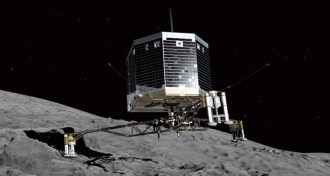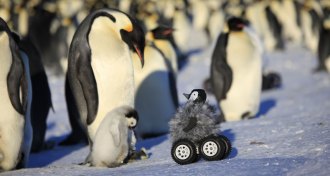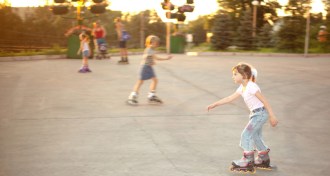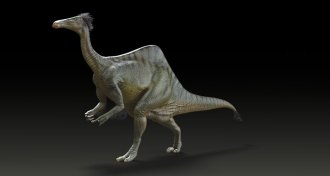News in Brief
-
 Astronomy
AstronomyRendezvous with a comet
On November 12, Rosetta mission scientists successfully completed the first-ever attempt to put a lander on a comet. See all Science News coverage of Rosetta and Philae's voyage to comet 67P/Churyumov-Gerasimenko.
-
 Animals
AnimalsRemote-controlled rover doesn’t spook penguins
Remote-controlled rovers get close to skittish penguins without bothering them; a chick disguise wins over the wariest birds.
-
 Paleontology
PaleontologySome trilobites sported dual digestive tracts
CT scans reveal trilobites with two-lane digestive tracts.
-
 Health & Medicine
Health & MedicineMini stomachs grown in lab
Clumps of human gastric cells could help researchers study stomach diseases.
By Meghan Rosen -
 Neuroscience
NeuroscienceBrain difference found in people with chronic fatigue
Abnormality found in the brains of a small number of people with chronic fatigue syndrome is intriguing, but needs to be confirmed with more patients.
-
 Environment
EnvironmentOil from BP spill may be sitting on seafloor
More than four years after the Deepwater Horizon disaster in the Gulf of Mexico, scientists find that oil is still lingering over a large area on the seafloor.
By Beth Mole -
 Health & Medicine
Health & MedicineDaylight savings time tied to more exercise in children
Kids in Europe and Australia are slightly more active in longer-lit evenings, a new study shows.
By Nathan Seppa -
 Archaeology
ArchaeologyIce Age hunter-gatherers lived at extreme altitudes
Two archaeological sites in the Andes indicate that hunter-gatherers inhabited extreme altitudes earlier than previously thought.
-
 Paleontology
PaleontologyMystery fossils belonged to giant ostrichlike dinosaur
Two recently found skeletons reveal that Deinocheirus, first discovered 50 years ago, was the largest-known dinosaur of its kind.
By Meghan Rosen -
 Humans
HumansAnglo-Saxons left language, but maybe not genes to modern Britons
Modern Britons may be more closely related to Britain’s indigenous people than they are to the Anglo-Saxons, a new genetic analysis finds.
-
 Physics
PhysicsLaser tractor beam tugs on beads
A new experiment is the first to construct a tractor beam that can pull objects over long distances with light.
By Andrew Grant -
 Genetics
GeneticsGene variant helps dog evade muscular dystrophy
A dog that has a mutation causing muscular dystrophy has another genetic variant that appears to counteract the disease.